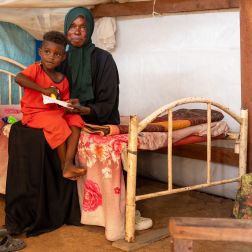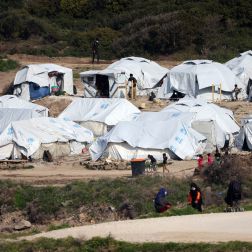- 5 mins read time
- Published: 27th January 2023
East Africa Hunger Crisis Update | Your Support In 2022

27.6 million people are suffering from food insecurity
Did you know that when you give a gift to one household – it is shared. That is the strength of community in East Africa. One family will not eat knowing a neighbour is hungry. Neighbours are invited to the table to share the meal.
Donors like you, are part of that community. You provide the rice and potatoes cooked by Safia (below) to enable a meal to be shared with her family and neighbours.

Safia asked Oxfam to express her gratitude to donors like you: “What makes me happy is seeing my kids satisfied and having no problems.” Thanks to your support and kindness, Oxfam can work immediately to save lives, while also building resilience for the future.
In Badana, Kenya, hunger is a familiar feeling for Safia. The worst drought to hit the area in more than 40 years has devastated her livelihood; her lifestock. The death of her goats has left her struggling to feed herself and her family.
Thanks to Oxfam supporters like you, families like Safia’s are receiving essential non-food items (like water purifying tablets, hygiene items and jerry can’s for water storage) alongside cash transfers.
Safia receives €68/£59 per month which enables her to buy food in local markets, keeping her family safe from malnutrition, and also helps her to pay school fees so she can keep her children in education. This aid not only helps people to survive but gives them an opportunity to build resilience for the future!
“We are surviving on that money to escape death from hunger. It’s our only hope” Every day, people in East Africa, like Safia, are suffering the calamitous effects of climate change. Despite being responsible for less than 0.05% of global carbon emissions, they are bearing the brunt of the damage. Over the last decade they have been repeatedly stuck by climate-related shocks, and as they build on the devastation of each other – recovering becomes more and more difficult.
We hope now, thanks to a huge win at COP27, that when a similar emergency hits, finance will be available at the beginning of the crisis. This will enable faster responses – which in turn will save lives, protect dignity and provide climate justice for the proud people of Kenya, Somalia, and Ethiopia. They will no longer be dependent on assistance. Instead, they will receive their due compensation from the climate ‘Loss and Damage’ fund.
COP27 and its Effect on Global Equality
After three decades of campaigning work from developing countries, NGOs, activists, and grassroots movements the world over, a dedicated fund will be created to provide justice for communities on the frontline of the climate crisis. This was confirmed during COP27.
This was a huge win for climate justice advocates everywhere. Oxfam has been working to amplify local voices, campaigners and our supporters like you.
This dedicated finance facility will help to rebalance the scales and provide justice to frontline communities suffering from loss and damage to their homelands.
Leaders in disaster preparedness & prevention
Oxfam works with local grassroots organisations and committees to ensure resilience to climate shocks are available where needed. Just one example is detailed below.
Reforesting the ocean
There is little between the town of Dolores in the Philippines, and the full force of the typhoons that sweep in from the Pacific—storms that are increasing in frequency and intensity.
However, the women of the Dolores community are making the most of what they have available to tackle natural disaster. Two hundred meters from shore is a mangrove forest—a tangle of low trees that are perfectly adapted to salt water and tides—which buffers the coastal communities from destructive waves and winds.
In the past, people harvested the mangroves to make fires and fences, but now the women are working to protect and restore them.

However, the women of the Dolores community are making the most of what they have available to tackle natural disaster. Two hundred meters from shore is a mangrove forest—a tangle of low trees that are perfectly adapted to salt water and tides—which buffers the coastal communities from destructive waves and winds.
In the past, people harvested the mangroves to make fires and fences, but now the women are working to protect and restore them.
In 2021, Oxfam and partner SIKAT (the Center for the Development of Indigenous Science and Technology) encouraged this group of female leaders to form a savings group and become active in disaster management. Oxfam have also provided training to help them take their rightful place as decision makers in their community, and together we are achieving success with the mangrove project.

This community has planted thousands of mangrove saplings, enlisting their communities and local authorities to lend a hand, and they could not be more enthusiastic about the results.
The women in this community still have many other challenges to contend with, but it’s clear they treasure their time together. “I used to stay at home, but now I go out with the other women and we laugh together,” says Purificio Rosales. “I feel stronger.”

The women in this community still have many other challenges to contend with, but it’s clear they treasure their time together. “I used to stay at home, but now I go out with the other women and we laugh together,” says Purificio Rosales. “I feel stronger.”




